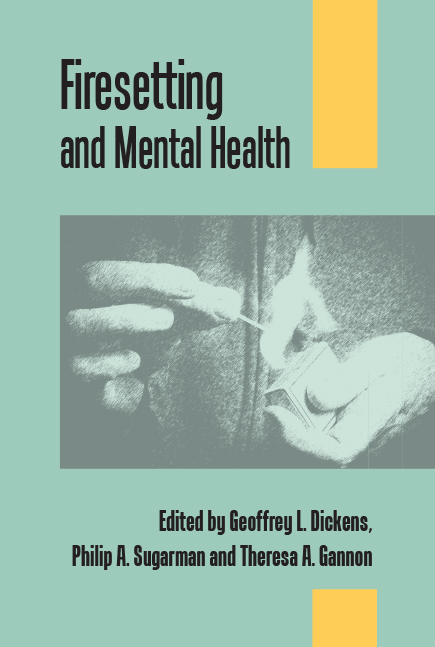Book contents
- Frontmatter
- Contents
- List of figures, tables and boxes
- List of contributors
- Preface
- Part I Theory and research
- 1 Adult firesetters: prevalence, characteristics and psychopathology
- 2 Theories on arson: the action systems model
- 3 Differentiating firesetters: lessons from the literature on motivation and dangerousness
- 4 The potential relevance of brain dysfunction in arson
- 5 The developmental aspects of firesetting
- 6 Intellectual disability and arson
- 7 Female arsonists and firesetters
- 8 Power and excitement in arson: the case of firefighter arson
- Part II Practice and law
- Index
6 - Intellectual disability and arson
from Part I - Theory and research
- Frontmatter
- Contents
- List of figures, tables and boxes
- List of contributors
- Preface
- Part I Theory and research
- 1 Adult firesetters: prevalence, characteristics and psychopathology
- 2 Theories on arson: the action systems model
- 3 Differentiating firesetters: lessons from the literature on motivation and dangerousness
- 4 The potential relevance of brain dysfunction in arson
- 5 The developmental aspects of firesetting
- 6 Intellectual disability and arson
- 7 Female arsonists and firesetters
- 8 Power and excitement in arson: the case of firefighter arson
- Part II Practice and law
- Index
Summary
Arson and other offending behaviours by people with intellectual disability are recognised to be a significant problem for healthcare and social care services and the criminal justice system. There is a lack of robust research evidence and guidance for assessment and treatment procedures for this group of individuals. There has always been an uncertainty in defining who these individuals are and establishing what works for them. Few studies have examined the characteristics of offenders with intellectual disability, especially in relation to arson. The difficulties in attempting to study the characteristics of offenders in this population are due to changing definitions of the terms ‘intellectual disability’ and ‘offending behaviour’. This is compounded by the shifting attitudes of society, the reactionary political agenda towards public safety (Thornicroft & Szmukler, 2005) and the reaction and tolerance levels of carers to the behaviour of people with intellectual disabilities (Lyall et al, 1995) which may be deemed to be challenging or criminal, depending on the context and seriousness of the behaviours concerned. There are also ongoing changes in the criminal justice system (CJS), highlighted below, and several other factors that affect those who are labelled as ‘offenders with intellectual disability’ (Barron et al, 2002). The other limitations in interpreting research findings are that the numbers of offenders with intellectual disability are small even in larger, general cohorts of offenders and that studies specifically of offenders with intellectual disability have small sample sizes (Johnston & Halstead, 2000).
Background
History has provided us with some useful insights into the association between the concepts of intellectual disability and offending and challenging behaviour. In the 14th century people who were subnormal were called ‘idiots’ and were considered not to blame for their crimes, and in the 17th century people were acquitted of crimes on the basis of their cognitive difficulties (Walker & McCabe, 1968). In the early 20th century, the eugenics movement resulted from scientific theories that were used to imply a causal link between ‘feeble mindedness’ and criminality. This resulted in distorting effects on the political agenda, prejudices and preconceptions, and eventually in social programmes like negative eugenics and voluntary sterilisation. This problem was compounded by the enactment of the Mental Deficiency Act 1913, which increased the segregation and isolation of those with intellectual disability.
- Type
- Chapter
- Information
- Firesetting and Mental Health , pp. 107 - 125Publisher: Royal College of PsychiatristsFirst published in: 2017

